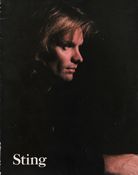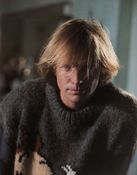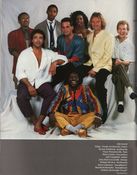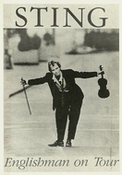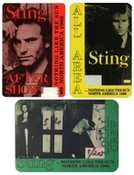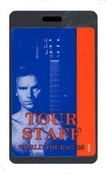
Nothing Like The Sun
Jul
30
1988
Costa Mesa, CA, US
Pacific Coast Amphitheater
Sting, band deliver polished performance lacking improvisation...
The well-oiled machine that is Sting and his current band took the stage Saturday at the Pacific Amphitheatre and proceeded to demonstrate that they are, uh, a well-oiled machine.
If you wanted superbly sung and well-executed music that traversed or blended pop, rock, jazz, reggae and funk, Sting delivered. If you wanted a nine-piece unit with vocal and instrumental chops galore, Sting delivered. If you wanted a set list representing Police songs and both albums Sting has released on his own, Sting delivered. If you wanted some of the greatest cheekbones in pop music, Sting delivered.
But you also had to accept fairly slick playing with surprisingly little sympathetic interplay among the band members, given the orientation of the music and musicians involved.
In his two post-Police excursions, 'The Dream of the Blue Turtles' and '...Nothing Like the Sun', Sting has ventured into jazz explorations, teaming with such ace jazz musicians as keyboardist Kenny Kirkland and saxophonist Branford Marsalis, who were with him again Saturday night.
Yet there wasn't even a hint of jazzlike improvising on stage. One player never prodded another into some unplanned instrumental flight of fancy - because in a Sting show, nothing is left to chance. (If you don't think that Sting and singer Dolette McDonald engage in those ''spontaneous'' dance steps - or that he and some of the musicians engage in those ''spontaneous'' antics - exactly the same way every night, we have some ''Jesse Jackson for President'' buttons we'd like to sell you.)
Meanwhile, the ex-Police chief has pretty much turned his back on rock'n'roll and on the inspiring, whole-is-greater-than-the sum-of-the-parts quality of a first-rate rock band playing together. The current approach yielded music so often subdued that on the surface, it could have passed for New Age musings or even cocktail-lounge pop.
So how did Sting manage to wind up with a largely triumphant concert?
Well, beneath that surface (and beyond the aforementioned superb musicianship), it still came down to songs. And this man (born Gordon Sumner) has written a trunkload of good ones, many of which he performed in Saturday's two-part performance.
The selections encompassed a fairly sweeping range of topics, from a wry nod to author Quentin Crisp (Englishman in New York) to the relatively simply romantic pledge of 'We'll Be Together', to 'They Dance Alone (Gueca Solo)', which is about the female relatives of Chilean political prisoners who dance alone in public protest.
In a move he may repeat when he performs on the upcoming Amnesty tour, Sting introduced 'If You Love Somebody Set Them Free' by saying: ''This song is for a man called Nelson Mandela and for all the children in South African jails - you'd be surprised how many there are.''
With that, the band lit into one of the more forceful renditions of the evening. As for Mr. Sumner himself, he played some keyboards, rendered some deft guitar playing and sounded typically sharp and expressive vocally, whether opting for his gritty croon or his tenor bark.
Even with all those hotshot musicians surrounding him, there was never a moment's doubt that Sting is always the key cog in this well-oiled machine.
(c) The Los Angeles Times by Duncan Strauss
Pop icon losing his Sting...
As a pop musician, Sting has been on a pinnacle for years, particularly as the founder of the Police. Far from being merely a smashing commercial success, this handsome and talented Briton has, in many ways, attracted a legion of fans as vocal and devoted as those of the Beatles.
But when one starts to dabble in jazz, in fact to label oneself as the leader of a jazz band, the ground becomes a bit more like quicksand. In the post-Police concert film 'Bring on the Night', Sting was full of pretension, making it sound as though he was Louis Armstrong reinventing one of the seminal jazz bands of the 1920s.
Well, based on the two and a half hour Saturday night Pacific Amphitheatre show by Sting's latest band, let's just say that ol' Satchmo is very, very safe in his niche.
A performance by Sting and company is about as far removed from a truly satisfying jazz concert as a granola bar is from a 10-course Cantonese meal.
Without doubt, the band is populated with stellar jazz musicians, most notably pianist Kenny Kirkland and tenor saxophonist Branford Marsalis. In fact, legend has it that Branford's brother, trumpeter Wynton, actually kicked him out of his own combo because of his association with Sting. One can easily see why - brother Branford, despite possessing a sumptuous tone and unusual improvisational ability, was relegated about 99 percent of the time Saturday to playing ensemble lines on his weaker instrument, the soprano sax, and was afforded negligible room to solo.
In fact, the entire eight-piece band is really nothing more than window dressing for the self-possessed Sting, who churned out tight but ear-splitting renditions of some old Police staples such as 'Walking in Your Footsteps', 'King of Pain' and 'Don't Stand So Close to Me'.
To his credit, Sting did manage to have some fun with the old material.
After he broke into one of his loveliest melodies, 'Every Breath You Take', he did something literally jazzy with it, showing how a chord progression can be molded into an entirely different song. 'Cherokee' became 'Ko-Ko' for Charlie Parker, 'Every Breath You Take' modulated into 'Let's Twist Again (Like We Did Last Summer'.)
Sting also offered up plenty of material from his 'Dream of the Blue Turtles' album as well as most of his latest release, 'Nothing Like the Sun'. None of the tunes on those two platters have the melodic staying power of the Police stuff, but some tunes played Saturday night, especially 'We'll Be Together' and 'Rock Steady', do have that pleasing Police-ish reggae beat.
And Sting is quite underrated as a guitarist - he showed his skills most convincingly on both electric and acoustic instruments, the latter often played in lush, romantic, flamenco style.
Not surprisingly, the capacity crowd, mostly female, ate up every note. But unfortunately, while all this was going on, the likes of Marsalis and Kirkland were left with the opportunity to do little more than noodle. Kirkland, a very fluent bebop-ish pianist working out on an electric keyboard, dashed out a couple of nice little solos, particularly on a slow tune that might even have been 'Summertime'.
At least Kirkland looked like a jazz musician, sitting there hunched over the keys in a weathered porkpie hat. Marsalis fared much, much worse. Often, he would lapse into a sound reminiscent of the old Yakkity Sax record. It seems incredible that the same saxist cut the straight-ahead, jazz-pure Renaissance album.
(c) The Orange County Register by Steve Eddy
The well-oiled machine that is Sting and his current band took the stage Saturday at the Pacific Amphitheatre and proceeded to demonstrate that they are, uh, a well-oiled machine.
If you wanted superbly sung and well-executed music that traversed or blended pop, rock, jazz, reggae and funk, Sting delivered. If you wanted a nine-piece unit with vocal and instrumental chops galore, Sting delivered. If you wanted a set list representing Police songs and both albums Sting has released on his own, Sting delivered. If you wanted some of the greatest cheekbones in pop music, Sting delivered.
But you also had to accept fairly slick playing with surprisingly little sympathetic interplay among the band members, given the orientation of the music and musicians involved.
In his two post-Police excursions, 'The Dream of the Blue Turtles' and '...Nothing Like the Sun', Sting has ventured into jazz explorations, teaming with such ace jazz musicians as keyboardist Kenny Kirkland and saxophonist Branford Marsalis, who were with him again Saturday night.
Yet there wasn't even a hint of jazzlike improvising on stage. One player never prodded another into some unplanned instrumental flight of fancy - because in a Sting show, nothing is left to chance. (If you don't think that Sting and singer Dolette McDonald engage in those ''spontaneous'' dance steps - or that he and some of the musicians engage in those ''spontaneous'' antics - exactly the same way every night, we have some ''Jesse Jackson for President'' buttons we'd like to sell you.)
Meanwhile, the ex-Police chief has pretty much turned his back on rock'n'roll and on the inspiring, whole-is-greater-than-the sum-of-the-parts quality of a first-rate rock band playing together. The current approach yielded music so often subdued that on the surface, it could have passed for New Age musings or even cocktail-lounge pop.
So how did Sting manage to wind up with a largely triumphant concert?
Well, beneath that surface (and beyond the aforementioned superb musicianship), it still came down to songs. And this man (born Gordon Sumner) has written a trunkload of good ones, many of which he performed in Saturday's two-part performance.
The selections encompassed a fairly sweeping range of topics, from a wry nod to author Quentin Crisp (Englishman in New York) to the relatively simply romantic pledge of 'We'll Be Together', to 'They Dance Alone (Gueca Solo)', which is about the female relatives of Chilean political prisoners who dance alone in public protest.
In a move he may repeat when he performs on the upcoming Amnesty tour, Sting introduced 'If You Love Somebody Set Them Free' by saying: ''This song is for a man called Nelson Mandela and for all the children in South African jails - you'd be surprised how many there are.''
With that, the band lit into one of the more forceful renditions of the evening. As for Mr. Sumner himself, he played some keyboards, rendered some deft guitar playing and sounded typically sharp and expressive vocally, whether opting for his gritty croon or his tenor bark.
Even with all those hotshot musicians surrounding him, there was never a moment's doubt that Sting is always the key cog in this well-oiled machine.
(c) The Los Angeles Times by Duncan Strauss
Pop icon losing his Sting...
As a pop musician, Sting has been on a pinnacle for years, particularly as the founder of the Police. Far from being merely a smashing commercial success, this handsome and talented Briton has, in many ways, attracted a legion of fans as vocal and devoted as those of the Beatles.
But when one starts to dabble in jazz, in fact to label oneself as the leader of a jazz band, the ground becomes a bit more like quicksand. In the post-Police concert film 'Bring on the Night', Sting was full of pretension, making it sound as though he was Louis Armstrong reinventing one of the seminal jazz bands of the 1920s.
Well, based on the two and a half hour Saturday night Pacific Amphitheatre show by Sting's latest band, let's just say that ol' Satchmo is very, very safe in his niche.
A performance by Sting and company is about as far removed from a truly satisfying jazz concert as a granola bar is from a 10-course Cantonese meal.
Without doubt, the band is populated with stellar jazz musicians, most notably pianist Kenny Kirkland and tenor saxophonist Branford Marsalis. In fact, legend has it that Branford's brother, trumpeter Wynton, actually kicked him out of his own combo because of his association with Sting. One can easily see why - brother Branford, despite possessing a sumptuous tone and unusual improvisational ability, was relegated about 99 percent of the time Saturday to playing ensemble lines on his weaker instrument, the soprano sax, and was afforded negligible room to solo.
In fact, the entire eight-piece band is really nothing more than window dressing for the self-possessed Sting, who churned out tight but ear-splitting renditions of some old Police staples such as 'Walking in Your Footsteps', 'King of Pain' and 'Don't Stand So Close to Me'.
To his credit, Sting did manage to have some fun with the old material.
After he broke into one of his loveliest melodies, 'Every Breath You Take', he did something literally jazzy with it, showing how a chord progression can be molded into an entirely different song. 'Cherokee' became 'Ko-Ko' for Charlie Parker, 'Every Breath You Take' modulated into 'Let's Twist Again (Like We Did Last Summer'.)
Sting also offered up plenty of material from his 'Dream of the Blue Turtles' album as well as most of his latest release, 'Nothing Like the Sun'. None of the tunes on those two platters have the melodic staying power of the Police stuff, but some tunes played Saturday night, especially 'We'll Be Together' and 'Rock Steady', do have that pleasing Police-ish reggae beat.
And Sting is quite underrated as a guitarist - he showed his skills most convincingly on both electric and acoustic instruments, the latter often played in lush, romantic, flamenco style.
Not surprisingly, the capacity crowd, mostly female, ate up every note. But unfortunately, while all this was going on, the likes of Marsalis and Kirkland were left with the opportunity to do little more than noodle. Kirkland, a very fluent bebop-ish pianist working out on an electric keyboard, dashed out a couple of nice little solos, particularly on a slow tune that might even have been 'Summertime'.
At least Kirkland looked like a jazz musician, sitting there hunched over the keys in a weathered porkpie hat. Marsalis fared much, much worse. Often, he would lapse into a sound reminiscent of the old Yakkity Sax record. It seems incredible that the same saxist cut the straight-ahead, jazz-pure Renaissance album.
(c) The Orange County Register by Steve Eddy


